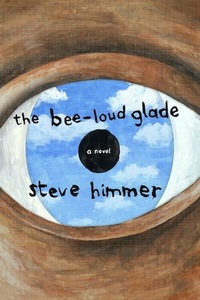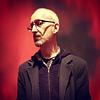Take a photo of a barcode or cover
The Bee-Loud Glade is an enjoyable, interesting look at simple and solitary living. It strikes a good balance between humor and meditative reflection, and is so well written that I am eager to explore Himmer’s other works. There are more than a few quotable, philosophical gems scattered throughout the novel.
The Bee-Loud Glade by Steve Himmer, is a genuinely refreshing and engaging novel. The first few chapters, detailing the narrator's previous life as an "office drone" were immediately easy to relate to, and I'm sure that's the case for most people. Almost all of us are trapped in meaningless, boring, alienating jobs that offer us nothing in the way of "spiritual" or emotional nourishment. So the whole premise for the novel, that someone just like us is given the opportunity to work as a hermit in the garden of an eccentric billionaire - well, that sounds just dandy to me, where do I sign up? And that's really the key to why this book works - we've probably all wanted to be in that position.
The writing is of a very high standard, not stylistically heavy or showy, just what is needed, which makes it incredibly easy to read. That coupled with relatively short chapters, means you should tear through this very quickly, as you move back and forth with the narration, from present to the past, which never feel awkward or jarring.
All in, this was an amiable, amusing, very enjoyable read, and I highly recommend it.
The writing is of a very high standard, not stylistically heavy or showy, just what is needed, which makes it incredibly easy to read. That coupled with relatively short chapters, means you should tear through this very quickly, as you move back and forth with the narration, from present to the past, which never feel awkward or jarring.
All in, this was an amiable, amusing, very enjoyable read, and I highly recommend it.
While I liked and enjoyed reading this book, it did not live up to expectations. Perhaps my expectations, based on some reviews, were too high. I liked the story and Finch was certainly an original character, but I wished that the writing would have been more lyrical. I expected more from Finch, a blogger, who had previously created several online personas. Nearly, done with the book, I thought perhaps the simple reporting-style writing was Himmer’s intention, but I would have enjoyed the book more if I had enjoyed the words more.
Finch is an employee of Second Nature. He seems to hide in his cube, not doing much of anything, though he has created several online bloggers in his job of “brand-awareness.” After he is fired, he becomes a sort-of-hermit in his apartment. Then, through online spam, Finch becomes a “decorative hermit” (loved that term!) in the garden of millionaire, Mr. Crane. As a decorative hermit, Finch’s days are directed by Crane and his contacts are limited to Mr. and Mrs. Crane and the butler, Smithee.
I liked and didn’t like that the Old Man and the scribe were not really explained. And I’m not sure if I liked or didn’t like the introduction of the hikers, though I guess they were Finch’s future. I wondered about friends and family Finch left behind. And what became of Mr. and Mrs. Crane and what was Mr. Crane’s crime – Was he a Bernie Madoff type?
I now want to reread Thoreau’s Walden to which The Bee-Loud Glade was compare. I suspect that I will find the prose more satisfying.
“Without those variations of light and shade, my mornings in this garden might become as mundane as they were when I worked for a living.” (139)
“It’s hard to tell, sometimes, in such a wild and tangled part of the world, whether I’ve left the path or am still walking on it. So I try to worry about only one step at a time, not where those steps are leading in accumulation.” (164)
“I pretend my solitude is isolation, that I’ve erased myself from the world, but I’m more in it than I’ve ever been. Which is to say, not very much, no more and no less than anyone else – we may have a more lasting impact on the world when we break down into nutrients and raw material that nourish a whole chain of life, insects and earthworms and grass, than we ever have when we’re alive. Perhaps that’s the closest any one of us comes to knowing how things fit together.” (203)
Now, looking back and rereading sections that I had marked, I am reconsidering. Maybe the words are more beautiful than I had thought….
Finch is an employee of Second Nature. He seems to hide in his cube, not doing much of anything, though he has created several online bloggers in his job of “brand-awareness.” After he is fired, he becomes a sort-of-hermit in his apartment. Then, through online spam, Finch becomes a “decorative hermit” (loved that term!) in the garden of millionaire, Mr. Crane. As a decorative hermit, Finch’s days are directed by Crane and his contacts are limited to Mr. and Mrs. Crane and the butler, Smithee.
I liked and didn’t like that the Old Man and the scribe were not really explained. And I’m not sure if I liked or didn’t like the introduction of the hikers, though I guess they were Finch’s future. I wondered about friends and family Finch left behind. And what became of Mr. and Mrs. Crane and what was Mr. Crane’s crime – Was he a Bernie Madoff type?
I now want to reread Thoreau’s Walden to which The Bee-Loud Glade was compare. I suspect that I will find the prose more satisfying.
“Without those variations of light and shade, my mornings in this garden might become as mundane as they were when I worked for a living.” (139)
“It’s hard to tell, sometimes, in such a wild and tangled part of the world, whether I’ve left the path or am still walking on it. So I try to worry about only one step at a time, not where those steps are leading in accumulation.” (164)
“I pretend my solitude is isolation, that I’ve erased myself from the world, but I’m more in it than I’ve ever been. Which is to say, not very much, no more and no less than anyone else – we may have a more lasting impact on the world when we break down into nutrients and raw material that nourish a whole chain of life, insects and earthworms and grass, than we ever have when we’re alive. Perhaps that’s the closest any one of us comes to knowing how things fit together.” (203)
Now, looking back and rereading sections that I had marked, I am reconsidering. Maybe the words are more beautiful than I had thought….
Interesting premise and some fun twists and imaginings of what it would be like to be a paid hermit on a rich man's estate. But in other ways fell a bit flat, with some random plot elements and an ending that felt superficial and a bit too perfect.
Steve Himmer's debut novel, The Bee Loud Glade is a beautifully written story about a man who is hired to become a mute hermit while living among the flora and fauna of a private estate. Finch, who answers a spam email has been fired from his job which seemed to be a lot of energy spent doing nothing. He comes to embrace the outdoors and living alone with nature. This is a very peaceful read about a man discovering how to live a meaningful life and learning what skills and talents he may have been hiding, not only from others, but from himself. The story embraces other idea and themes and is very different from what I usually read. That said, I highly recommend it as a change of pace, especially for a lazy summer day.
Excellent read, very introspective. I can't wait for more from this author!
A strange little book about meditation and appreciating the quiet, small things in life.
Finch begins the story as an office drone who has a boring job and a boring, unsatisfying life. He eventually falls into the opportunity to become an estate hermit for an eccentric millionaire and over time he becomes a grizzled, skinny, nearly blind hermit who lives off the land in his bee-loud glade and finds that his spartan life is more valuable that money.
A book that highlights the beauty of meditation, nature, silence, and connections (however brief) with other people.
It's not a book for everybody, but if you've ever daydreamed about wandering around in the backcountry of our National Parks or retreating to Walden Pond, I think you'll enjoy it very much.
(I TOALLY want to be somebody's hermit now!)
Finch begins the story as an office drone who has a boring job and a boring, unsatisfying life. He eventually falls into the opportunity to become an estate hermit for an eccentric millionaire and over time he becomes a grizzled, skinny, nearly blind hermit who lives off the land in his bee-loud glade and finds that his spartan life is more valuable that money.
A book that highlights the beauty of meditation, nature, silence, and connections (however brief) with other people.
It's not a book for everybody, but if you've ever daydreamed about wandering around in the backcountry of our National Parks or retreating to Walden Pond, I think you'll enjoy it very much.
(I TOALLY want to be somebody's hermit now!)
I was watching The Road Warrior the other day. (I know, right? I hadn't either.) It was at the part where Max's car, the last of the V8 Interceptors, is ruined, and he gets flown back to the oil rig and kind of has to make a decision about what he does next. And I thought: Wow, this reminds me so much of The Bee-Loud Glade.
Which is not to say that The Bee-Loud Glade perfectly encapsulates a dystopian/post-apocalyptic Australian sub-continent punk esthetic. It doesn't! At all. But it is to say that this book, written by my friend Steve: not only did I love it, but it genuinely affected me, seeping into my brain & being, and becoming part of the cultural (pop- and otherwise) lens through which I experience the world.
I think this book hit me at the right time. I was lucky enough to get a copy of the manuscript last year, and all I really knew about it was that it was about someone living off the grid. So I waited to read it until I was on vacation at the beach for a week. No internet and no TV, you know? OK yes I read it on my Kindle but still. That's actually fitting. This isn't an anti-technology book. It's not an us vs them book, or a turning-back-the-clock book. It's something else, something much bigger, more honest and meaningful and universal, and more fun, too.
I am hesitant to talk too much about what it was about, for me. But I have lived in the country and I have lived in the city. I have not known my neighbors, and I have hated my neighbors for letting me know far too much about them. I have struggled, my whole life, with wanting to be left alone, and wanting to be part of something bigger. So when I read this book, it just sang to me. No reservations or complaints or hesitations whatsoever. I am really glad that it exists.
Which is not to say that The Bee-Loud Glade perfectly encapsulates a dystopian/post-apocalyptic Australian sub-continent punk esthetic. It doesn't! At all. But it is to say that this book, written by my friend Steve: not only did I love it, but it genuinely affected me, seeping into my brain & being, and becoming part of the cultural (pop- and otherwise) lens through which I experience the world.
I think this book hit me at the right time. I was lucky enough to get a copy of the manuscript last year, and all I really knew about it was that it was about someone living off the grid. So I waited to read it until I was on vacation at the beach for a week. No internet and no TV, you know? OK yes I read it on my Kindle but still. That's actually fitting. This isn't an anti-technology book. It's not an us vs them book, or a turning-back-the-clock book. It's something else, something much bigger, more honest and meaningful and universal, and more fun, too.
I am hesitant to talk too much about what it was about, for me. But I have lived in the country and I have lived in the city. I have not known my neighbors, and I have hated my neighbors for letting me know far too much about them. I have struggled, my whole life, with wanting to be left alone, and wanting to be part of something bigger. So when I read this book, it just sang to me. No reservations or complaints or hesitations whatsoever. I am really glad that it exists.
The Bee-Loud Glade begins with a man and his lame job. He's a blogger- just kidding - I mean, he is, but it's not like that. He works for a company that manufactures artificial plants, and he is hired to blog about the product under the guise of many different customers. He doesn't do much, and eventually his employer figures it out. And then he is without job, until a very strange opportunity comes his way: the opportunity to be a hermit for hire in a very rich man's very beautiful garden.
Reading the first pages of this book, I knew I was going to like it. And I really did. It's pretty early to say, but I could see it being a favorite of the year. Himmer's approach to addressing concerns about the drudgery of work, and disconnection with the environment feel so entirely fresh (even though it does have a folk story or allegorical quality that other reviewers have pointed out). I haven't read a book like this one before. The voice of the narrator is spot on, and his evolution in the garden feels authentic. The themes in the book are also the ones that I really like to read about. There is a whole lot in here about artificiality and illusion, and how the search for the authentic is impossible. Finch, the narrator, must wade through so many layers of illusion in his life to find what is meaningful experience: fake plants, fake bloggers, a fake garden filled with surveillance, etc. And it is only as he goes blind that he begins to reach the core of experience that he is seeking.
Although the book could have been nothing but pages of contemplation on the issues that I bring up above (and I probably would have still liked it), it isn't that. The book is well-plotted. I didn't want to stop reading it, and I wanted to know what was going to happen next. I liked Finch, and I felt with him as he passed through trials and tribulations on his path to his own personal enlightenment, which, like I said, is nothing like anything you might read in a self-help book. Highly recommended.
Reading the first pages of this book, I knew I was going to like it. And I really did. It's pretty early to say, but I could see it being a favorite of the year. Himmer's approach to addressing concerns about the drudgery of work, and disconnection with the environment feel so entirely fresh (even though it does have a folk story or allegorical quality that other reviewers have pointed out). I haven't read a book like this one before. The voice of the narrator is spot on, and his evolution in the garden feels authentic. The themes in the book are also the ones that I really like to read about. There is a whole lot in here about artificiality and illusion, and how the search for the authentic is impossible. Finch, the narrator, must wade through so many layers of illusion in his life to find what is meaningful experience: fake plants, fake bloggers, a fake garden filled with surveillance, etc. And it is only as he goes blind that he begins to reach the core of experience that he is seeking.
Although the book could have been nothing but pages of contemplation on the issues that I bring up above (and I probably would have still liked it), it isn't that. The book is well-plotted. I didn't want to stop reading it, and I wanted to know what was going to happen next. I liked Finch, and I felt with him as he passed through trials and tribulations on his path to his own personal enlightenment, which, like I said, is nothing like anything you might read in a self-help book. Highly recommended.






